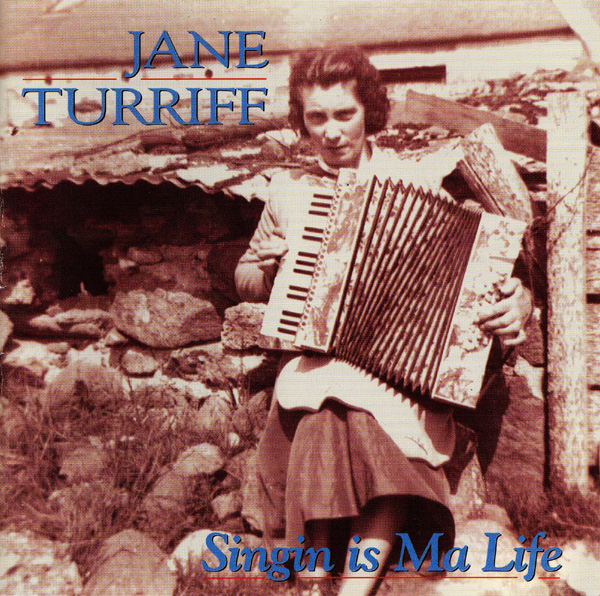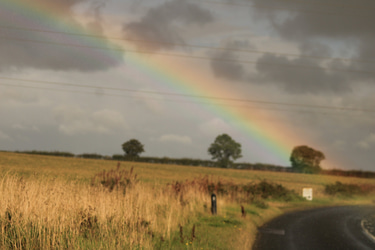CHRISTINA STEWART AND THE TURRIFFS
Although Christina Stewart, and her daughter Jane Turriff with husband Cameron, lived In Garval Street, Fettercairn, and were related to Elizabeth's family, she makes no mention of them in her autobiography. Mother and daughter lived across the street from each other.
'Ma Mum wis a very very hard-workin woman an singin wis her life. She niver thought that she wis singin well, not like whit we think nowdays. We think we're gaun away tae sing [at] festivals. She never got away nowhere. She wis always scrubbin the floor an washin clothes wi her hands, and carried the water from the well. Bit they were always happy, always this singin, singin. All that big long songs, I learned from her.
'And ma grannie that always used to be singin too, two grannies, ma mother's mother and ma father's mother. I've heard ma granda singin an aa fin they're goin away at their work in the mornin. As happy as a lark. very happy.'
From the notes of Jane Turriff's CD titled Singin is Ma Life, Springthyme SPCD 1038.
JANE TURRIFF'S OBITUARY IN MUSICAL TRADITIONS WEBSITE
The Scots travellers have been the single strongest community carrying traditional songs in Britain over the last century. Amongst them have been many of our major traditional singers. Jane Turriff was in the front rank amongst the very finest.
She was born to Donald and Christina Stewart - Donald a fiddle player and Teeny a piper and singer. Her uncle was the great Davie Stewart and her maternal grandmother was an Irish traveller who brought another dimension and extension to the family's song repertoire.
Jane became part of this great heritage and even as a girl was recognised as an outstanding singer in an extended family and community that had great number of such talents. She also took to instruments like many of her family and she played piano, accordion and, her greatest love, the harmonium (or was it an American organ?). She had a huge, highly decorated one of these and it dominated the bedroom of the tiny cottage where she lived in Gaval Street, Fetterangus. Like her uncle Davie, she had her own ideas on harmony that did not always fit with conventional musical theory, but had a way of fitting the songs in the way that she attacked them.
Jane was first recorded at her home in Fetterangus in 1955 by Hamish Henderson and these established her name amongst ethnomusicologists as one of the greats. Soon after the foundation of The Traditional Music and Song Association of Scotland in 1966, the wonderful festivals in Blairgowrie and then Kinross began and Jane and her husband Cameron Turriff were regular invited guests and a generation of young enthusiasts was able to meet and enjoy all the finest that the Scots tradition had to offer. Many contacts were made and after the 1973 festival, Tina and I were invited up to spend a week with them in Fetterangus - and what a memorable week that was! Space being what it was, we put up our tent in the space behind their house.
The Turriff household could have been a rather lonely isolated place - for Jane was disabled and could only move on crutches and her husband was blind - but no, it was a happy, lively place mainly because of Jane's effervescent, bubbly personality and the fact that the house was full of music. There were plenty of visitors during the time that we were there and every visit was an occasion for more songs. We spent some of the week recording their songs and music on a portable cassette recorder and at other times they were recording us on their old Grundig reel-to-reel machine.
Listening to the nearly 50 items that we recorded from them before writing this, I find Mill o'Tiftie's Annie, Laird o'Drum, Dowie Dens o'Yarrow but also Danny Boy, Will The Angels Play Their Harps For Me and A Mother's Love's A Blessing. Like so many traditional singers, Jane learned songs that just took her fancy. Clearly, she realised the importance of the 'Auld Sangs' as she called them and was always very animated and affected by them. However she said that her favourite singer was Jimmy Rodgers; we never heard any of his songs from her during that week, that had to wait until the following year's Kinross Festival.
It was a late, late night session in the hall at the Kirklands Hotel. Most of the entertainment was coming from the trio of Tom Anderson, Aly Bain and Peerie Willie Johnson. They were playing Willie's jazz repertoire rather than their Shetland tunes. Singers were being asked up to sing a song each and then it was Jane's turn. Her yodelling cowboy song accompanied by the Shetlanders brought the house down. Of course, there had to be an encore but that was not enough once Jane had got the bit between her teeth. She sang quite a number of the Rodgers' repertoire that night.
Although, she was hugely popular at the TMSA festivals, I don't suppose that she sang at many folk clubs. She did sing as a guest at our club in Lewes, however. This came about not that long after Cameron's death. Her great friend, Allan Palmer, had invited her down for a break, a bit of a holiday, to his house in Surrey. He contacted us and asked if we would like to meet her again when she was down and it ended up with us offering a club booking. Allan brought her to our house first and she spotted our harmonium. Well, that rather killed things as far as conversation was concerned, but it was a joy to hear her sing again.
She gave us a great night at the club, but when I went to pay her, she was horrified. "Naw, naw, laddie! If they find oot aboot it they'll stop ma pension!" She was adamant; I ended up giving the money to Allan to give to her once she was convinced that no authorities would hear of it or if he couldn't do that, he was to use the money to buy something she needed when he drove her back home.
Times have changed and we will never see the likes of Jane again, but many people who knew her will carry that pleasure and the privilege of knowing her for the rest of their lives.Vic Smith - 6.12.13
GOLDSTEIN'S RECORDINGS
There are four reels listed as recordings by Christina, Jane and Cameron in the Ole Miss Goldstein Archive, but there are various listing errors. Two reels were copied by Goldstein to the School of Scottish Studies and are in Tobar An Dualchais - but not the below one, or another which is labelled 'Battle Songs' and is in fact lusty singing in an English folk club.
.
I lament that the below reel, with some very intriguing titles, has clearly been put in a different box with a different wrong listing, and has not I think been copied to Edinburgh. The reel that has the below Christina Stewart listing has in fact nine tracks from Lucy Stewart!
"Christina Stewart, 25 April [?] / Side 2" by Christina (Teeny) Stewart (olemiss.edu)
3] The Beggar Man / Christina Stewart; I was Born a Bastard / Christina Stewart; When Willie Comes Home / Christina Stewart; As I was a walking In Lawton's Grand Theory / Christina Stewart; I Was Leaving dear Old Ireland / Christina Stewart; The Velvet Blue / Christina Stewart; I'm Blue Blue / Christina Stewart; Talk about Blue / Christina Stewart; By the Old Mill / Christina Stewart; The Pretty Irish Maid / Christina Stewart; I wish I was Married to Geordie / Christina Stewart; The Flash Girls / Christina Stewart; Galloway Hills / Christina Stewart; Barbara Allen / Christina Stewart
"Torriffs and Stewarts, July 1960 / Side 1" by Christina (Teeny) Stewart (olemiss.edu)
(olemiss.edu)


The Tarves Rant, April 1960 Track ID: 57050
The singer has been drinking with friends and has an altercation with a policeman. He is arrested and sent for trial in Aberdeen, where he is fined and made to pay the policeman for his torn coat. View Track
The Hielan'man's Ball, April 1960 Track ID: 57051
The song details the guests at the Highland Fancy Ball. View Track
Dr. Pritchard, April 1960 Track ID: 57052
The song tells of Dr Pritchard, who murdered his wife. His children rebuke him. View Track
The Derby Ram, April 1960 Track ID: 57053
The song tells of a ram of extraordinary proportions. Christina Stewart learned the song from her mother. View Track
MacPherson's Rant, April 1960 Track ID: 57054
MacPherson, about to be hanged, challenges anyone in Scotland to cross swords with him. He breaks his fiddle and says he does not repent.
The Battle o Harlaw, April 1960 Track ID: 57060
The song is an account of the indecisive Battle of Harlaw, the heroism of Lord Forbes and the death of MacDonald.
Christina Stewart learned the ballad from her mother. View Track
Erin go Bragh, April 1960 Track ID: 57061
Erin-go-Bragh has a violent encounter with an Edinburgh policeman who accuses him of being an Irish immigrant. He says he is not, but what matter if he was? A fight ensues. View Track
Queen Among the Heather, April 1960 Track ID: 57062
The singer meets a shepherdess and falls in love with her. View Track
MacPherson's Rant, April 1960 Track ID: 57065
MacPherson, about to be hanged, challenges anyone in Scotland to cross swords with him. He breaks his fiddle and says he does not repent.
Dr. Pritchard, April 1960 Track ID: 57066
The song tells of Dr Pritchard, who murdered his wife. His children rebuke him. View Track
Barbara Allen, April 1960
Barbara Allen goes to see her sick lover, but refuses to kiss him and tells him he is dying. When she hears the death bell she repents and dies of a broken heart. View Track
If I were a Blackbird, April 1960 Track ID: 57071
The singer says if she were a blackbird she would fly to her lover's ship.
My Wee Doggie, April 1960 Track ID: 57074
The singer has been seduced, made pregnant and abandoned by a young man. Christina Stewart learned the song from her mother. View Track
Bogieside, April 1960 Track ID: 57076
The singer is leaving Bogieside and saying farewell to his sweetheart.
View Track
The Hill o Bennachie, April 1960 Track ID: 57078
The singer meets a young lady on the hill of Bennachie and asks her to go with him. View Track
My Troosers, April 1960 Track ID: 57082
The singer used to hang his trousers up at night, but his wife used to raid his pockets, so now he wears a kilt. View Track
Nice to Get Up in the Morning, April 1960 Track ID: 57083
The singer says it is nice to get up in the morning but better to stay in bed.
View Track
he Girl in Clogs and Shawl, April 1960 Track ID: 57085
The singer prefers his girl in her clogs and her shawl.
Christina Stewart says the song is very old.
Lassie Wi' the Milking Pail, April 1960 Track ID: 57086
The young sailor tries to persuade the milkmaid to go away with him, but she rejects him and he leaves heartbroken. View Track
Just a Twelve Months, Mother, April 1960 Track ID: 57090
The girl asks her mother to take care of her illegitimate baby and warns other girls to beware of young men.
